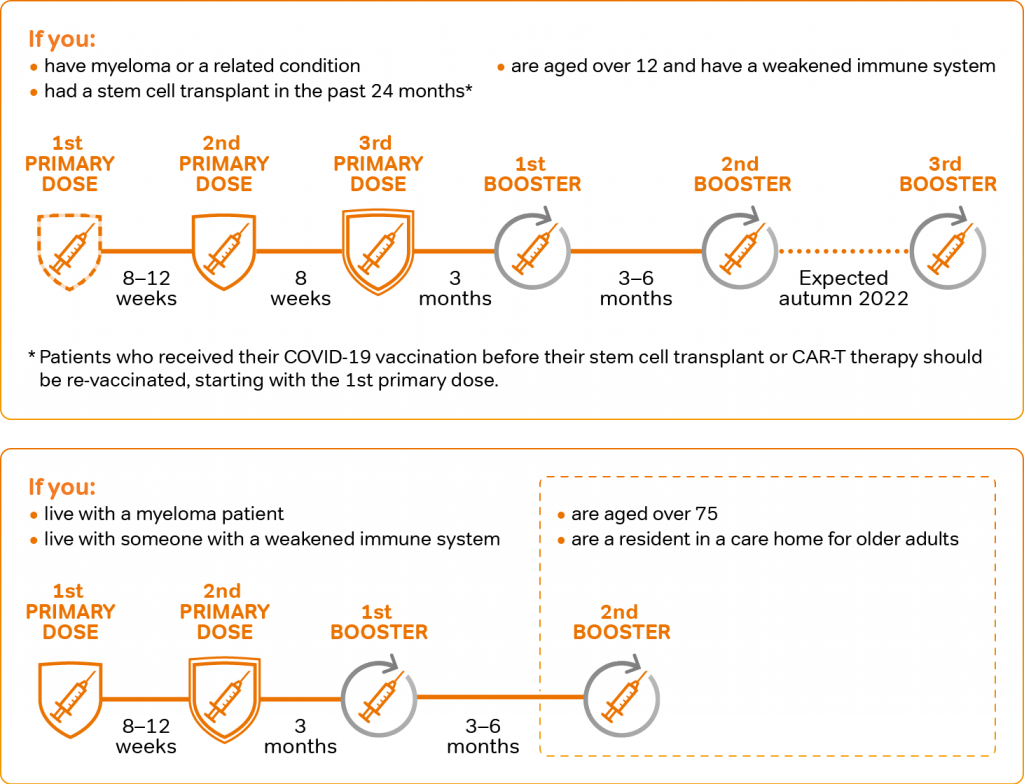Information and guidance around COVID-19 are constantly being updated. Catch up on the most important updates from the last quarter affecting myeloma patients.
AL amyloidosis patients are now eligible for COVID-19 treatments
The Department of Health and Social Care (DHSC) has updated its list of patients deemed at the highest risk of COVID-19 to include AL amyloidosis patients.
The DHSC recommends COVID-19 treatments for all patients with any symptoms, and a positive test, who are considered at the highest risk.
Myeloma UK has produced a letter that provides information and further clarification for COVID-19 treatment providers regarding people with myeloma and other chronic B-cell lymphoproliferative disorders and their eligibility for COVID-19 treatments.
Make sure your patients get their second COVID-19 booster
It’s important that all myeloma patients, and those with related conditions, keep up to date with their COVID-19 vaccines.
Make sure your patients get their second booster, also known as spring booster, if it has been 3-6 months since their first booster.
Although the Department and Health and Social Care (DHSC) advised that the spring booster programme ends on 30 June 2022, people will still be eligible to get their second booster through the summer. This means, however, that patients will not be able to book appointments for their second boosters online and may need a referral or a letter from their healthcare team to secure an appointment.

Blood Cancer UK Vaccine Research Collaborative research presented at BSH
In April, outcomes from the Blood Cancer UK Vaccine Research Collaborative were presented at the 62nd Annual Scientific Meeting of the British Society for Haematology.
The Research Collaborative, a partnership between Blood Cancer UK, Myeloma UK, Anthony Nolan and BSHG, funds several studies aiming to understand the risk COVID-19 poses to blood cancer patients.
The session presented results from research projects, including two myeloma-specific studies.
The PREPARE study, led by Dr Karthik Ramasamy, evidenced that 93% of the 214 myeloma patients had anti-spike antibodies after their second dose of a COVID-19 vaccine. This is markedly increased from the earlier phase of testing for antibodies present in the blood at least 21 days after one dose of the COVID-19 vaccine.
Another study carried out by Professor Kwee Yong at the University College Hospital London also evidenced a significant increase in anti-spike antibodies after a second dose of a COVID-19 vaccine, compared to the first dose, in patients with plasma cell disorders (including myeloma).
Both studies demonstrate the immune response to COVID-19 vaccination is attenuated by poor disease control. Further doses of the COVID-19 vaccine stimulated more patients to elicit a humoral response. Both studies agree it’s vital that patients continue to get vaccinated as COVID-19 vaccines are rolled out.
COVID-19 had a greater impact on myeloma patients than on other blood cancers
Researchers from Queen’s University Belfast and the University of Aberdeen presented a poster at BSH on the psychosocial impact of the COVID-19 pandemic on myeloma and blood cancer patients.
Results from the April to June 2020 IMPaCCT study (an online, self-reporting survey) showed that 84% of the 944 blood cancer patients surveyed reported that COVID-19 had changed their lives, and 63% found these changes hard to manage. Myeloma patients reported more problems with pain and mobility.
The most affected health services were haematology visits, with 70% of myeloma patients reporting changes to appointments compared to 52% in all other blood cancers. Over one-third of myeloma patients experienced delays, changes or even cancellations to their treatments, compared to 11% in other blood cancers included in the study.
Myeloma patients experienced more physical pain than other blood cancer patients, potentially due to older age, and were significantly more concerned about COVID-19. This is especially important given the pandemic’s greater impact on the care of myeloma patients.
COVID-19 continues to impact the lives of myeloma patients, carers, family, and friends. We review COVID-19 information every week. For all the latest updates, please visit our COVID-19 information hub.
